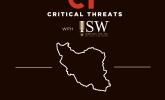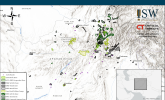November 30, 2022 - ISW Press
Russian efforts around Bakhmut indicate that Russian forces have fundamentally failed to learn from previous high-casualty campaigns concentrated on objectives of limited operational or strategic significance. Russian forces have continually expended combat strength on small settlements around Bakhmut since the end of May; in the following six months, they have only secured gains on the order of a few kilometers at a time. As ISW has previously observed, Russian efforts to advance on Bakhmut have resulted in the continued attrition of Russian manpower and equipment, pinning troops on relatively insignificant settlements for weeks and months at a time. This pattern of operations closely resembles the previous Russian effort to take Severodonetsk and Lysychansk earlier in the war. As ISW assessed throughout June and July of this year, Ukrainian forces essentially allowed Russian troops to concentrate efforts on Severodonetsk and Lysychansk, two cities near the Luhansk Oblast border of limited operational and strategic significance, in order to capitalize on the continued degradation of Russian manpower and equipment over the course of months of grinding combat. Russian troops eventually captured Lysychansk and Severodonetsk and reached the Luhansk Oblast border, but that tactical success translated to negligible operational benefit as the Russian offensive in the east then culminated. Russian efforts in this area have remained largely stalled along the lines that they reached in early July. Even if Russian troops continue to advance toward and within Bakhmut, and even if they force a controlled Ukrainian withdrawal from the city (as was the case in Lysychansk), Bakhmut itself offers them little operational benefit. The costs associated with six months of brutal, grinding, and attrition-based combat around Bakhmut far outweigh any operational advantage that the Russians can obtain from taking Bakhmut. Russian offensives around Bakhmut, on the other hand, are consuming a significant proportion of Russia’s available combat power, potentially facilitating continued Ukrainian counteroffensives elsewhere.








